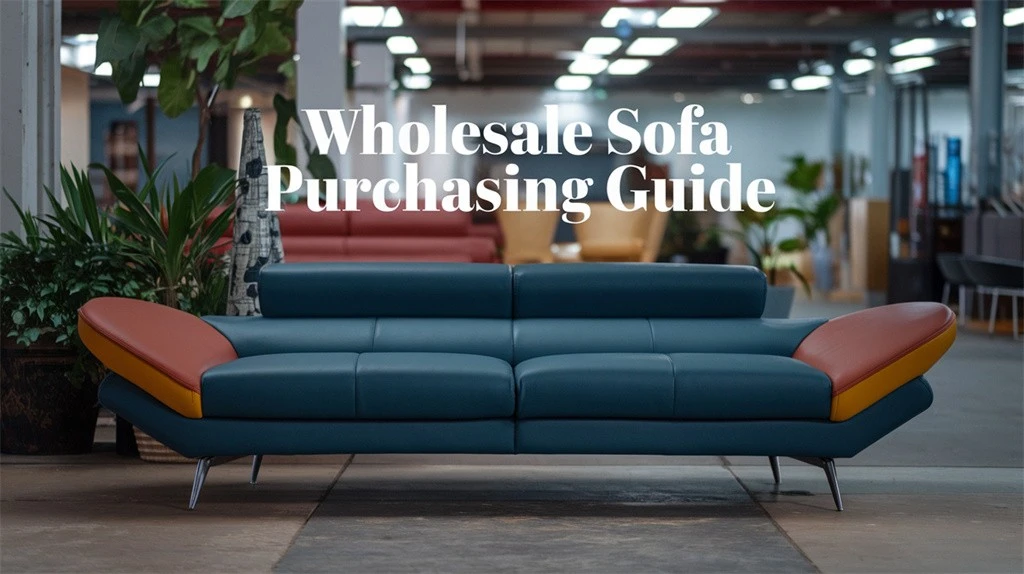When engaging in wholesale sofa purchasing, several key factors need to be considered to ensure a successful and profitable transaction. Here is a comprehensive guide to help you make informed decisions.

Understand Market Demands and Space Planning
Before making any purchases, it is essential to understand your target market and customer needs. Research different regions or customer groups to identify their preferences for sofa styles, materials, and functionalities. This research will help you choose the most suitable products for the market.
- Market Analysis: Understand your customer base’s specific needs, including their preferred styles, materials, and functionalities. This research helps in selecting the most appropriate products for the market.
- Measure Your Space: Measure your warehouse or display space to ensure the chosen sofas fit perfectly and do not make the room feel cluttered or sparse.

Choose the Right Sofa Type and Material
The market offers various types of sofas, and choosing the right type and material is crucial for your business.
- Sofa Types: Include single-seat, double-seat, sectional, and sofa beds. Choose the most appropriate type based on your customer demands and market trends.
- Material Selection: Sofa materials directly impact comfort, durability, and maintenance requirements. Common materials include fabric, genuine leather, solid wood, and rattan. Each material has its unique characteristics and uses:
- Fabric Sofas: Suitable for a light, natural home style, allowing you to create a unique personal style through different fabric choices.
- Leather Sofas: More commonly found in classic, luxurious settings, adding a high-end feel to your living space.

Inspect Quality and Structure
Inspecting the quality and structure of the sofas is vital to ensure they meet the required standards.
- External Inspection: Check the sofa’s exterior for any irregularities, ensuring that the frame is well-constructed and there are no gaps or defects in the joints or edges.
- Internal Structure: Inspect the internal structure to ensure that the frame uses mortise and tenon joints rather than nails, and that the joints are secure and not loose.
- Cushioning Materials: Most sofas use foam cushioning, which has a lifespan. When purchasing new or used sofas, sit on them to check the resilience of the cushions.

Supplier Selection and Price Negotiation
Choosing a reliable supplier is crucial.
- Supplier Selection: Choose suppliers with a good reputation for quality control and after-sales service. Understand their production capacity and delivery times to avoid delays.
- Price Negotiation: Set a budget and compare prices. Consider transportation and installation costs, and understand the price differences and discount policies offered by different suppliers.

Logistics and Transportation Arrangements
Ordering and logistics are critical aspects of wholesale sofa purchasing.
- Transportation Method: Understand the transportation process, including booking shipments, logistics handling, documentation, customs inspection, certificates of origin, customs clearance, and bill of lading confirmation. If you choose larger sofas, you may need to use cranes for transportation; ensure you consider factors like road accessibility, power lines, and window sizes.
- Protection and Maintenance: Ensure the sofas are protected during transportation. Choose durable, easy-to-clean materials and provide customer maintenance guides based on the material type. For example, fabric sofas need regular vacuuming and cleaning, while leather sofas require specialized cleaning products.

After-Sales Service and Maintenance
After-sales service and maintenance are crucial for customer satisfaction and long-term partnerships.
- After-Sales Support: Confirm the after-sales service provided by the supplier or platform, including repairs and replacement of parts. This is particularly important for used sofas.
- Maintenance Guide: Provide customer maintenance guides based on the material type. Inform customers how to perform daily maintenance, such as regular vacuuming for fabric sofas and using specialized cleaning products for leather sofas.

Compliance with Regulations
Ensure your wholesale sofa business complies with all relevant regulations and standards.
- Destination Country Regulations: Familiarize yourself with the import regulations and tax policies of the destination country. This includes understanding requirements such as customs inspection, certificates of origin, and ensuring compliance with relevant standards and regulations.
- Cultural Differences: Consider cultural differences that may impact sales and marketing strategies. Different cultural contexts may have varying preferences for sofa designs, styles, and functionalities.

By following these guidelines, you can ensure that your wholesale sofa purchasing process is well-informed, selecting high-quality products that meet customer needs while avoiding potential risks and issues.


